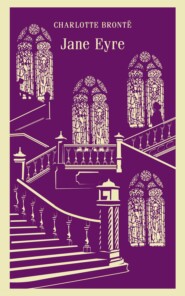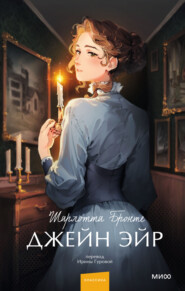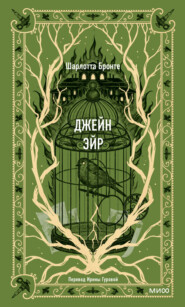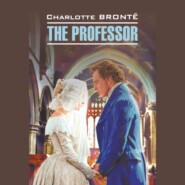По всем вопросам обращайтесь на: info@litportal.ru
(©) 2003-2024.
✖
Jane Eyre
Настройки чтения
Размер шрифта
Высота строк
Поля
“Who are you?” he asked of the intruder.
“My name is Briggs, a solicitor of – Street, London.”
“And you would thrust on me a wife?”
“I would remind you of your lady’s existence, sir, which the law recognises, if you do not.”
“Favour me with an account of her – with her name, her parentage, her place of abode.”
“Certainly.” Mr. Briggs calmly took a paper from his pocket, and read out in a sort of official, nasal voice: -
“‘I affirm and can prove that on the 20th of October A.D. – (a date of fifteen years back), Edward Fairfax Rochester, of Thornfield Hall, in the county of —, and of Ferndean Manor, in – shire, England, was married to my sister, Bertha Antoinetta Mason, daughter of Jonas Mason, merchant, and of Antoinetta his wife, a Creole, at – church, Spanish Town, Jamaica. The record of the marriage will be found in the register of that church – a copy of it is now in my possession. Signed, Richard Mason.’”
“That – if a genuine document – may prove I have been married, but it does not prove that the woman mentioned therein as my wife is still living.”
“She was living three months ago,” returned the lawyer.
“How do you know?”
“I have a witness to the fact, whose testimony even you, sir, will scarcely controvert.”
“Produce him – or go to hell.”
“I will produce him first – he is on the spot. Mr. Mason, have the goodness to step forward.”
Mr. Rochester, on hearing the name, set his teeth; he experienced, too, a sort of strong convulsive quiver; near to him as I was, I felt the spasmodic movement of fury or despair run through his frame. The second stranger, who had hitherto lingered in the background, now drew near; a pale face looked over the solicitor’s shoulder – yes, it was Mason himself. Mr. Rochester turned and glared at him. His eye, as I have often said, was a black eye: it had now a tawny, nay, a bloody light in its gloom; and his face flushed – olive cheek and hueless forehead received a glow as from spreading, ascending heart-fire: and he stirred, lifted his strong arm – he could have struck Mason, dashed him on the church-floor, shocked by ruthless blow the breath from his body – but Mason shrank away, and cried faintly, “Good God!” Contempt fell cool on Mr. Rochester – his passion died as if a blight had shrivelled it up: he only asked – “What have you to say?”
An inaudible reply escaped Mason’s white lips.
“The devil is in it if you cannot answer distinctly. I again demand, what have you to say?”
“Sir – sir,” interrupted the clergyman, “do not forget you are in a sacred place.” Then addressing Mason, he inquired gently, “Are you aware, sir, whether or not this gentleman’s wife is still living?”
“Courage,” urged the lawyer, – “speak out.”
“She is now living at Thornfield Hall,” said Mason, in more articulate tones: “I saw her there last April. I am her brother.”
“At Thornfield Hall!” ejaculated the clergyman. “Impossible! I am an old resident in this neighbourhood, sir, and I never heard of a Mrs. Rochester at Thornfield Hall.”
I saw a grim smile contort Mr. Rochester’s lips, and he muttered -
“No, by God! I took care that none should hear of it – or of her under that name.” He mused – for ten minutes he held counsel with himself: he formed his resolve, and announced it -
“Enough! all shall bolt out at once, like the bullet from the barrel. Wood, close your book and take off your surplice; John Green (to the clerk), leave the church: there will be no wedding to-day.” The man obeyed.
Mr. Rochester continued, hardily and recklessly: “Bigamy is an ugly word! – I meant, however, to be a bigamist; but fate has out-manoeuvred me, or Providence has checked me, – perhaps the last. I am little better than a devil at this moment; and, as my pastor there would tell me, deserve no doubt the sternest judgments of God, even to the quenchless fire and deathless worm. Gentlemen, my plan is broken up: – what this lawyer and his client say is true: I have been married, and the woman to whom I was married lives! You say you never heard of a Mrs. Rochester at the house up yonder, Wood; but I daresay you have many a time inclined your ear to gossip about the mysterious lunatic kept there under watch and ward. Some have whispered to you that she is my bastard half-sister: some, my cast-off mistress. I now inform you that she is my wife, whom I married fifteen years ago, – Bertha Mason by name; sister of this resolute personage, who is now, with his quivering limbs and white cheeks, showing you what a stout heart men may bear. Cheer up, Dick! – never fear me! – I’d almost as soon strike a woman as you. Bertha Mason is mad; and she came of a mad family; idiots and maniacs through three generations! Her mother, the Creole, was both a madwoman and a drunkard! – as I found out after I had wed the daughter: for they were silent on family secrets before. Bertha, like a dutiful child, copied her parent in both points. I had a charming partner – pure, wise, modest: you can fancy I was a happy man. I went through rich scenes! Oh! my experience has been heavenly, if you only knew it! But I owe you no further explanation. Briggs, Wood, Mason, I invite you all to come up to the house and visit Mrs. Poole’s patient, and my wife! You shall see what sort of a being I was cheated into espousing, and judge whether or not I had a right to break the compact, and seek sympathy with something at least human. This girl,” he continued, looking at me, “knew no more than you, Wood, of the disgusting secret: she thought all was fair and legal and never dreamt she was going to be entrapped into a feigned union with a defrauded wretch, already bound to a bad, mad, and embruted partner! Come all of you – follow!”
Still holding me fast, he left the church: the three gentlemen came after. At the front door of the hall we found the carriage.
“Take it back to the coach-house, John,” said Mr. Rochester coolly; “it will not be wanted to-day.”
At our entrance, Mrs. Fairfax, Adèle, Sophie, Leah, advanced to meet and greet us.
“To the right-about – every soul!” cried the master; “away with your congratulations! Who wants them? Not I! – they are fifteen years too late!”
He passed on and ascended the stairs, still holding my hand, and still beckoning the gentlemen to follow him, which they did. We mounted the first staircase, passed up the gallery, proceeded to the third storey: the low, black door, opened by Mr. Rochester’s master-key, admitted us to the tapestried room, with its great bed and its pictorial cabinet.
“You know this place, Mason,” said our guide; “she bit and stabbed you here.”
He lifted the hangings from the wall, uncovering the second door: this, too, he opened. In a room without a window, there burnt a fire guarded by a high and strong fender, and a lamp suspended from the ceiling by a chain. Grace Poole bent over the fire, apparently cooking something in a saucepan. In the deep shade, at the farther end of the room, a figure ran backwards and forwards. What it was, whether beast or human being, one could not, at first sight, tell: it grovelled, seemingly, on all fours; it snatched and growled like some strange wild animal: but it was covered with clothing, and a quantity of dark, grizzled hair, wild as a mane, hid its head and face.
“Good-morrow, Mrs. Poole!” said Mr. Rochester. “How are you? and how is your charge to-day?”
“We’re tolerable, sir, I thank you,” replied Grace, lifting the boiling mess carefully on to the hob: “rather snappish, but not ‘rageous.”
A fierce cry seemed to give the lie to her favourable report: the clothed hyena rose up, and stood tall on its hind-feet.
“Ah! sir, she sees you!” exclaimed Grace: “you’d better not stay.”
“Only a few moments, Grace: you must allow me a few moments.”
“Take care then, sir! – for God’s sake, take care!”
The maniac bellowed: she parted her shaggy locks from her visage, and gazed wildly at her visitors. I recognised well that purple face, – those bloated features. Mrs. Poole advanced.
“Keep out of the way,” said Mr. Rochester, thrusting her aside: “she has no knife now, I suppose, and I’m on my guard.”
“One never knows what she has, sir: she is so cunning: it is not in mortal discretion to fathom her craft.”
“We had better leave her,” whispered Mason.
“Go to the devil!” was his brother-in-law’s recommendation.
“‘Ware!” cried Grace. The three gentlemen retreated simultaneously. Mr. Rochester flung me behind him: the lunatic sprang and grappled his throat viciously, and laid her teeth to his cheek: they struggled. She was a big woman, in stature almost equalling her husband, and corpulent besides: she showed virile force in the contest – more than once she almost throttled him, athletic as he was. He could have settled her with a well-planted blow; but he would not strike: he would only wrestle. At last he mastered her arms; Grace Poole gave him a cord, and he pinioned them behind her: with more rope, which was at hand, he bound her to a chair. The operation was performed amidst the fiercest yells and the most convulsive plunges. Mr. Rochester then turned to the spectators: he looked at them with a smile both acrid and desolate.
“That is my wife,” said he. “Such is the sole conjugal embrace I am ever to know – such are the endearments which are to solace my leisure hours! And this is what I wished to have” (laying his hand on my shoulder): “this young girl, who stands so grave and quiet at the mouth of hell, looking collectedly at the gambols of a demon, I wanted her just as a change after that fierce ragout. Wood and Briggs, look at the difference! Compare these clear eyes with the red balls yonder – this face with that mask – this form with that bulk; then judge me, priest of the gospel and man of the law, and remember with what judgment ye judge ye shall be judged! Off with you now. I must shut up my prize.”
We all withdrew. Mr. Rochester stayed a moment behind us, to give some further order to Grace Poole. The solicitor addressed me as he descended the stair.
“You, madam,” said he, “are cleared from all blame: your uncle will be glad to hear it – if, indeed, he should be still living – when Mr. Mason returns to Madeira.”
“My uncle! What of him? Do you know him?”
“Mr. Mason does. Mr. Eyre has been the Funchal correspondent of his house for some years. When your uncle received your letter intimating the contemplated union between yourself and Mr. Rochester, Mr. Mason, who was staying at Madeira to recruit his health, on his way back to Jamaica, happened to be with him. Mr. Eyre mentioned the intelligence; for he knew that my client here was acquainted with a gentleman of the name of Rochester. Mr. Mason, astonished and distressed as you may suppose, revealed the real state of matters. Your uncle, I am sorry to say, is now on a sick bed; from which, considering the nature of his disease – decline – and the stage it has reached, it is unlikely he will ever rise. He could not then hasten to England himself, to extricate you from the snare into which you had fallen, but he implored Mr. Mason to lose no time in taking steps to prevent the false marriage. He referred him to me for assistance. I used all despatch, and am thankful I was not too late: as you, doubtless, must be also. Were I not morally certain that your uncle will be dead ere you reach Madeira, I would advise you to accompany Mr. Mason back; but as it is, I think you had better remain in England till you can hear further, either from or of Mr. Eyre. Have we anything else to stay for?” he inquired of Mr. Mason.
“No, no – let us be gone,” was the anxious reply; and without waiting to take leave of Mr. Rochester, they made their exit at the hall door. The clergyman stayed to exchange a few sentences, either of admonition or reproof, with his haughty parishioner; this duty done, he too departed.
I heard him go as I stood at the half-open door of my own room, to which I had now withdrawn. The house cleared, I shut myself in, fastened the bolt that none might intrude, and proceeded – not to weep, not to mourn, I was yet too calm for that, but – mechanically to take off the wedding dress, and replace it by the stuff gown I had worn yesterday, as I thought, for the last time. I then sat down: I felt weak and tired. I leaned my arms on a table, and my head dropped on them. And now I thought: till now I had only heard, seen, moved – followed up and down where I was led or dragged – watched event rush on event, disclosure open beyond disclosure: but now, I thought.
“My name is Briggs, a solicitor of – Street, London.”
“And you would thrust on me a wife?”
“I would remind you of your lady’s existence, sir, which the law recognises, if you do not.”
“Favour me with an account of her – with her name, her parentage, her place of abode.”
“Certainly.” Mr. Briggs calmly took a paper from his pocket, and read out in a sort of official, nasal voice: -
“‘I affirm and can prove that on the 20th of October A.D. – (a date of fifteen years back), Edward Fairfax Rochester, of Thornfield Hall, in the county of —, and of Ferndean Manor, in – shire, England, was married to my sister, Bertha Antoinetta Mason, daughter of Jonas Mason, merchant, and of Antoinetta his wife, a Creole, at – church, Spanish Town, Jamaica. The record of the marriage will be found in the register of that church – a copy of it is now in my possession. Signed, Richard Mason.’”
“That – if a genuine document – may prove I have been married, but it does not prove that the woman mentioned therein as my wife is still living.”
“She was living three months ago,” returned the lawyer.
“How do you know?”
“I have a witness to the fact, whose testimony even you, sir, will scarcely controvert.”
“Produce him – or go to hell.”
“I will produce him first – he is on the spot. Mr. Mason, have the goodness to step forward.”
Mr. Rochester, on hearing the name, set his teeth; he experienced, too, a sort of strong convulsive quiver; near to him as I was, I felt the spasmodic movement of fury or despair run through his frame. The second stranger, who had hitherto lingered in the background, now drew near; a pale face looked over the solicitor’s shoulder – yes, it was Mason himself. Mr. Rochester turned and glared at him. His eye, as I have often said, was a black eye: it had now a tawny, nay, a bloody light in its gloom; and his face flushed – olive cheek and hueless forehead received a glow as from spreading, ascending heart-fire: and he stirred, lifted his strong arm – he could have struck Mason, dashed him on the church-floor, shocked by ruthless blow the breath from his body – but Mason shrank away, and cried faintly, “Good God!” Contempt fell cool on Mr. Rochester – his passion died as if a blight had shrivelled it up: he only asked – “What have you to say?”
An inaudible reply escaped Mason’s white lips.
“The devil is in it if you cannot answer distinctly. I again demand, what have you to say?”
“Sir – sir,” interrupted the clergyman, “do not forget you are in a sacred place.” Then addressing Mason, he inquired gently, “Are you aware, sir, whether or not this gentleman’s wife is still living?”
“Courage,” urged the lawyer, – “speak out.”
“She is now living at Thornfield Hall,” said Mason, in more articulate tones: “I saw her there last April. I am her brother.”
“At Thornfield Hall!” ejaculated the clergyman. “Impossible! I am an old resident in this neighbourhood, sir, and I never heard of a Mrs. Rochester at Thornfield Hall.”
I saw a grim smile contort Mr. Rochester’s lips, and he muttered -
“No, by God! I took care that none should hear of it – or of her under that name.” He mused – for ten minutes he held counsel with himself: he formed his resolve, and announced it -
“Enough! all shall bolt out at once, like the bullet from the barrel. Wood, close your book and take off your surplice; John Green (to the clerk), leave the church: there will be no wedding to-day.” The man obeyed.
Mr. Rochester continued, hardily and recklessly: “Bigamy is an ugly word! – I meant, however, to be a bigamist; but fate has out-manoeuvred me, or Providence has checked me, – perhaps the last. I am little better than a devil at this moment; and, as my pastor there would tell me, deserve no doubt the sternest judgments of God, even to the quenchless fire and deathless worm. Gentlemen, my plan is broken up: – what this lawyer and his client say is true: I have been married, and the woman to whom I was married lives! You say you never heard of a Mrs. Rochester at the house up yonder, Wood; but I daresay you have many a time inclined your ear to gossip about the mysterious lunatic kept there under watch and ward. Some have whispered to you that she is my bastard half-sister: some, my cast-off mistress. I now inform you that she is my wife, whom I married fifteen years ago, – Bertha Mason by name; sister of this resolute personage, who is now, with his quivering limbs and white cheeks, showing you what a stout heart men may bear. Cheer up, Dick! – never fear me! – I’d almost as soon strike a woman as you. Bertha Mason is mad; and she came of a mad family; idiots and maniacs through three generations! Her mother, the Creole, was both a madwoman and a drunkard! – as I found out after I had wed the daughter: for they were silent on family secrets before. Bertha, like a dutiful child, copied her parent in both points. I had a charming partner – pure, wise, modest: you can fancy I was a happy man. I went through rich scenes! Oh! my experience has been heavenly, if you only knew it! But I owe you no further explanation. Briggs, Wood, Mason, I invite you all to come up to the house and visit Mrs. Poole’s patient, and my wife! You shall see what sort of a being I was cheated into espousing, and judge whether or not I had a right to break the compact, and seek sympathy with something at least human. This girl,” he continued, looking at me, “knew no more than you, Wood, of the disgusting secret: she thought all was fair and legal and never dreamt she was going to be entrapped into a feigned union with a defrauded wretch, already bound to a bad, mad, and embruted partner! Come all of you – follow!”
Still holding me fast, he left the church: the three gentlemen came after. At the front door of the hall we found the carriage.
“Take it back to the coach-house, John,” said Mr. Rochester coolly; “it will not be wanted to-day.”
At our entrance, Mrs. Fairfax, Adèle, Sophie, Leah, advanced to meet and greet us.
“To the right-about – every soul!” cried the master; “away with your congratulations! Who wants them? Not I! – they are fifteen years too late!”
He passed on and ascended the stairs, still holding my hand, and still beckoning the gentlemen to follow him, which they did. We mounted the first staircase, passed up the gallery, proceeded to the third storey: the low, black door, opened by Mr. Rochester’s master-key, admitted us to the tapestried room, with its great bed and its pictorial cabinet.
“You know this place, Mason,” said our guide; “she bit and stabbed you here.”
He lifted the hangings from the wall, uncovering the second door: this, too, he opened. In a room without a window, there burnt a fire guarded by a high and strong fender, and a lamp suspended from the ceiling by a chain. Grace Poole bent over the fire, apparently cooking something in a saucepan. In the deep shade, at the farther end of the room, a figure ran backwards and forwards. What it was, whether beast or human being, one could not, at first sight, tell: it grovelled, seemingly, on all fours; it snatched and growled like some strange wild animal: but it was covered with clothing, and a quantity of dark, grizzled hair, wild as a mane, hid its head and face.
“Good-morrow, Mrs. Poole!” said Mr. Rochester. “How are you? and how is your charge to-day?”
“We’re tolerable, sir, I thank you,” replied Grace, lifting the boiling mess carefully on to the hob: “rather snappish, but not ‘rageous.”
A fierce cry seemed to give the lie to her favourable report: the clothed hyena rose up, and stood tall on its hind-feet.
“Ah! sir, she sees you!” exclaimed Grace: “you’d better not stay.”
“Only a few moments, Grace: you must allow me a few moments.”
“Take care then, sir! – for God’s sake, take care!”
The maniac bellowed: she parted her shaggy locks from her visage, and gazed wildly at her visitors. I recognised well that purple face, – those bloated features. Mrs. Poole advanced.
“Keep out of the way,” said Mr. Rochester, thrusting her aside: “she has no knife now, I suppose, and I’m on my guard.”
“One never knows what she has, sir: she is so cunning: it is not in mortal discretion to fathom her craft.”
“We had better leave her,” whispered Mason.
“Go to the devil!” was his brother-in-law’s recommendation.
“‘Ware!” cried Grace. The three gentlemen retreated simultaneously. Mr. Rochester flung me behind him: the lunatic sprang and grappled his throat viciously, and laid her teeth to his cheek: they struggled. She was a big woman, in stature almost equalling her husband, and corpulent besides: she showed virile force in the contest – more than once she almost throttled him, athletic as he was. He could have settled her with a well-planted blow; but he would not strike: he would only wrestle. At last he mastered her arms; Grace Poole gave him a cord, and he pinioned them behind her: with more rope, which was at hand, he bound her to a chair. The operation was performed amidst the fiercest yells and the most convulsive plunges. Mr. Rochester then turned to the spectators: he looked at them with a smile both acrid and desolate.
“That is my wife,” said he. “Such is the sole conjugal embrace I am ever to know – such are the endearments which are to solace my leisure hours! And this is what I wished to have” (laying his hand on my shoulder): “this young girl, who stands so grave and quiet at the mouth of hell, looking collectedly at the gambols of a demon, I wanted her just as a change after that fierce ragout. Wood and Briggs, look at the difference! Compare these clear eyes with the red balls yonder – this face with that mask – this form with that bulk; then judge me, priest of the gospel and man of the law, and remember with what judgment ye judge ye shall be judged! Off with you now. I must shut up my prize.”
We all withdrew. Mr. Rochester stayed a moment behind us, to give some further order to Grace Poole. The solicitor addressed me as he descended the stair.
“You, madam,” said he, “are cleared from all blame: your uncle will be glad to hear it – if, indeed, he should be still living – when Mr. Mason returns to Madeira.”
“My uncle! What of him? Do you know him?”
“Mr. Mason does. Mr. Eyre has been the Funchal correspondent of his house for some years. When your uncle received your letter intimating the contemplated union between yourself and Mr. Rochester, Mr. Mason, who was staying at Madeira to recruit his health, on his way back to Jamaica, happened to be with him. Mr. Eyre mentioned the intelligence; for he knew that my client here was acquainted with a gentleman of the name of Rochester. Mr. Mason, astonished and distressed as you may suppose, revealed the real state of matters. Your uncle, I am sorry to say, is now on a sick bed; from which, considering the nature of his disease – decline – and the stage it has reached, it is unlikely he will ever rise. He could not then hasten to England himself, to extricate you from the snare into which you had fallen, but he implored Mr. Mason to lose no time in taking steps to prevent the false marriage. He referred him to me for assistance. I used all despatch, and am thankful I was not too late: as you, doubtless, must be also. Were I not morally certain that your uncle will be dead ere you reach Madeira, I would advise you to accompany Mr. Mason back; but as it is, I think you had better remain in England till you can hear further, either from or of Mr. Eyre. Have we anything else to stay for?” he inquired of Mr. Mason.
“No, no – let us be gone,” was the anxious reply; and without waiting to take leave of Mr. Rochester, they made their exit at the hall door. The clergyman stayed to exchange a few sentences, either of admonition or reproof, with his haughty parishioner; this duty done, he too departed.
I heard him go as I stood at the half-open door of my own room, to which I had now withdrawn. The house cleared, I shut myself in, fastened the bolt that none might intrude, and proceeded – not to weep, not to mourn, I was yet too calm for that, but – mechanically to take off the wedding dress, and replace it by the stuff gown I had worn yesterday, as I thought, for the last time. I then sat down: I felt weak and tired. I leaned my arms on a table, and my head dropped on them. And now I thought: till now I had only heard, seen, moved – followed up and down where I was led or dragged – watched event rush on event, disclosure open beyond disclosure: but now, I thought.

















